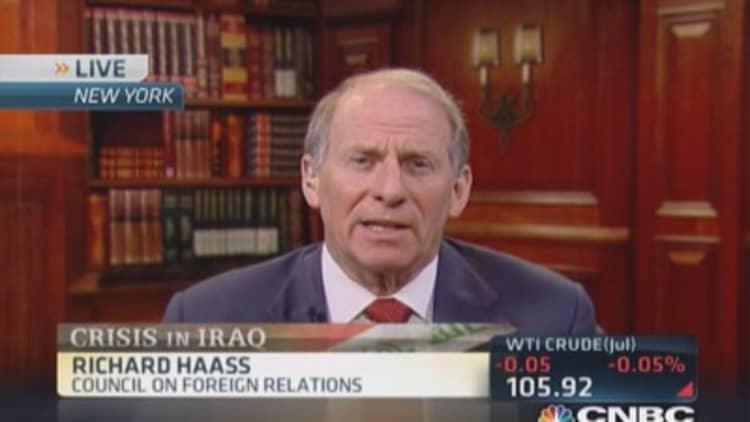
U.S. foreign policy in Iraq has long been a complete disaster and any military intervention into the country's current conflict is unlikely to bring peace, former U.S. diplomat Richard Haass told CNBC on Thursday.
"The sad thing is that after two administrations, more than a decade, more than, what, $2 trillion spent, more than 4,500 American lives lost, we now have an Iraq that's dominated by Iran and has become a haven for terrorists," Haass, president of the Council on Foreign Relations, said on "Squawk on the Street." "This is a foreign policy fiasco quite honestly that has spanned two administrations."
Unrest continues in Iraq even after American-led forces had boots on the ground during the war there, which spanned more than eight years and resulted in the ouster of Saddam Hussein's regime, Haass noted.
Today's crisis in Iraq, in which Sunni Muslim insurgents are making rapid territorial gains, can partly be blamed on Iraqi Prime Minister Nouri al-Maliki, Haass said.
Read More
"He's both a reflection of the problem, as well as the cause. He has been extremely sectarian in the way he's ruled," Haass said. "That said, Iraq has become a very sectarian country for any number of reasons over the last decade and the political culture is deeply flawed."
To Haass, al-Maliki's ouster would not solve Iraq's problems all together. "Iraq is going to be a messy place for years to come," likely split along sectarian lines and influenced by Iran, Haass said. At this point, he doesn't think further U.S. military action, including air power, would help.
"I think we've got to accept the fact that Iraq is going to be a deeply flawed place and resistant to American entreaties no matter what military involvement we have," he said.
—By CNBC's Drew Sandholm


